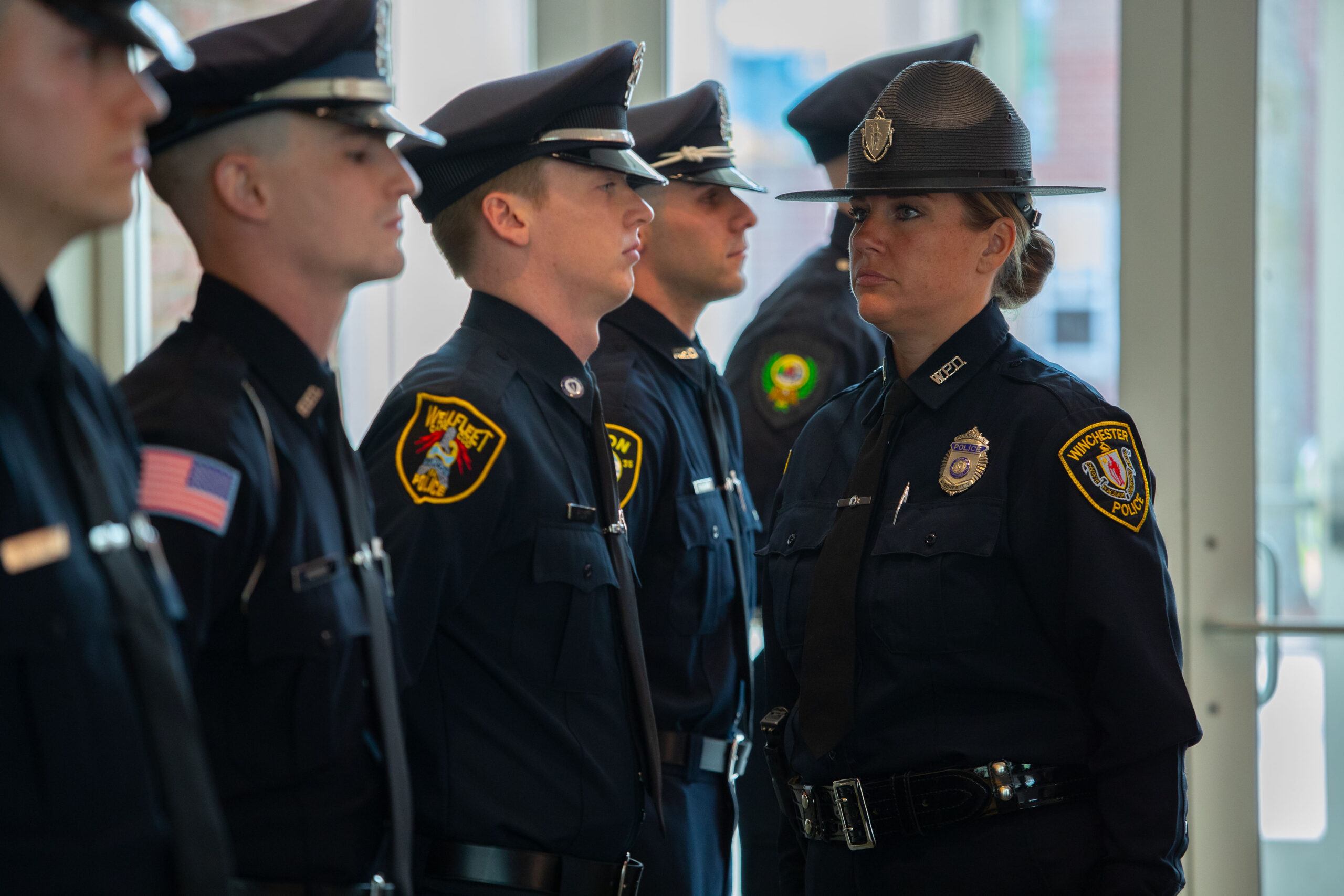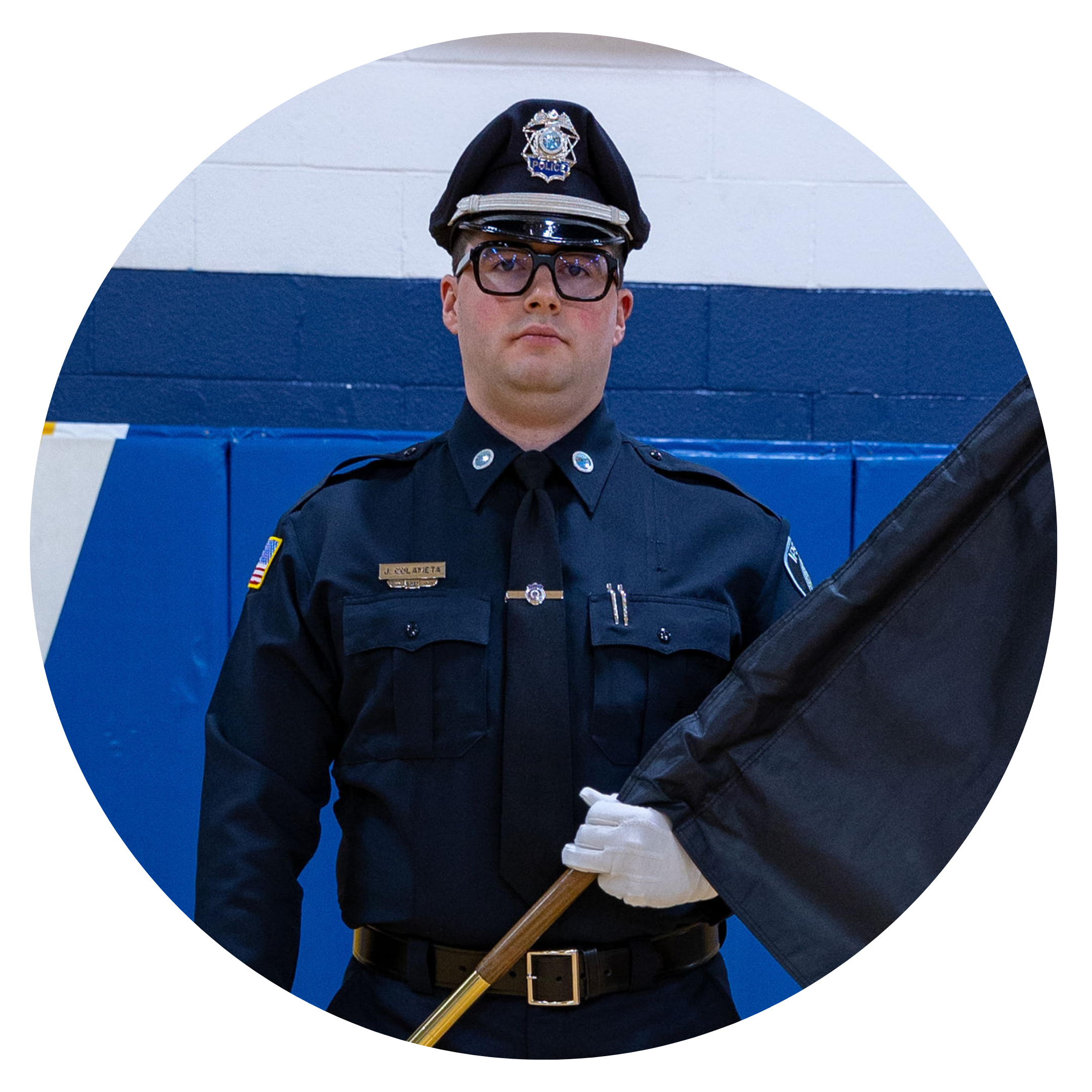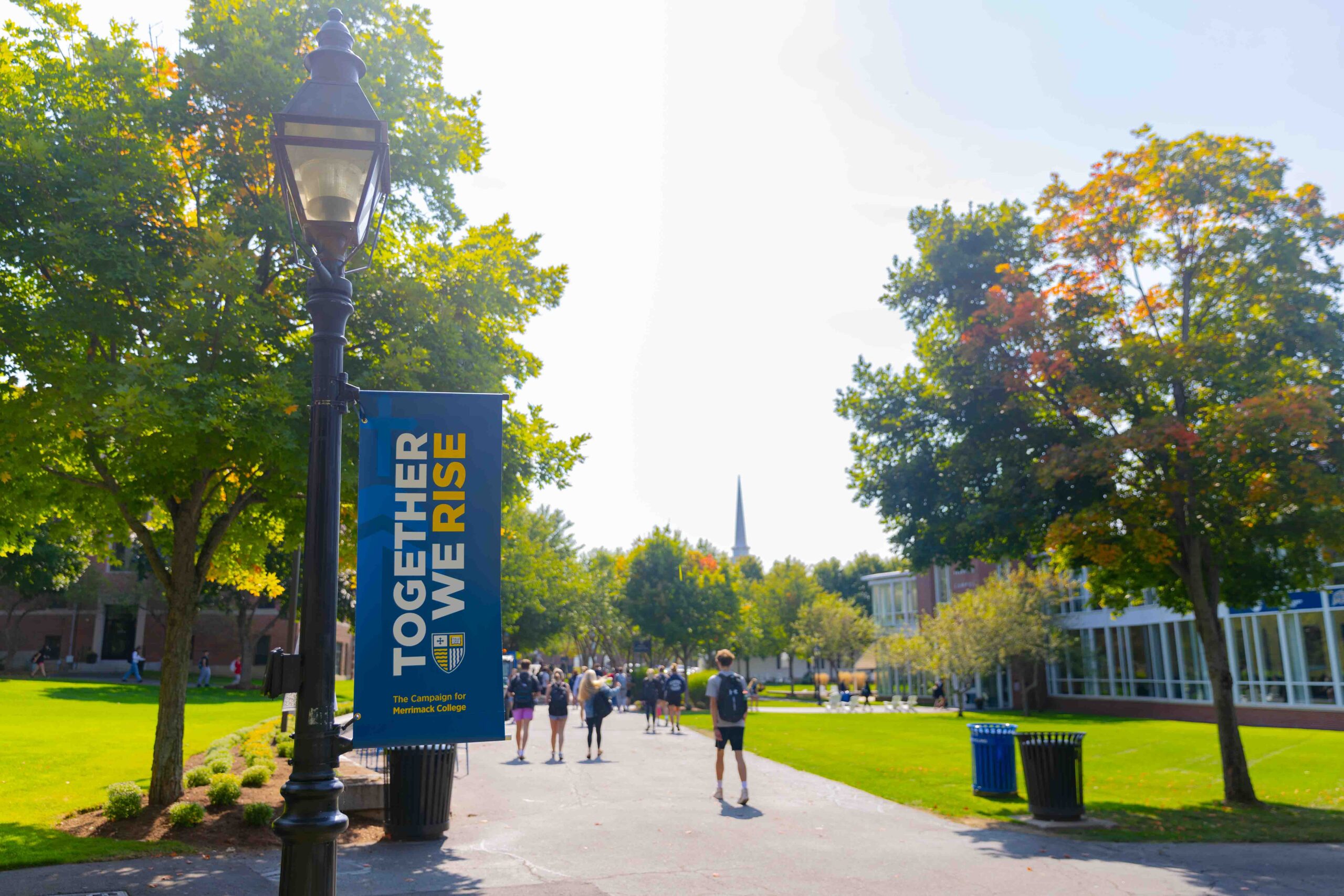Merrimack College offers a Police Academy Pathway to help you earn your master’s degree in tandem with your Police Academy Certification in as little as one year. Learn more about our Pathway!
Master of Science (M.S.) in Criminology and Criminal Justice
Engage in an affordable, convenient master’s with tangible connections to the field: police academy pathway, fellowships, plus your choice of 4 concentrations to modern criminal justice careers.
Go beyond the competition in your criminal justice education at an exceptional value. Choose a distinctive police academy pathway that allows you to advance your education alongside your field skills, or take one of four field-aligned concentrations that appear on your transcript, plus an optional capstone that transforms your real-world experience into academic credit – all a tuition cost of under $20K*.
Criminology and Criminal Justice Master’s Degree at a Glance
Mode of Study
100% Online
Est. Time
12 Months Full-time (Part-time Study Available)
Start Terms
Spring I & II, Summer I & II, Fall I & II
View Application Deadlines
Credits
32
Flexible Schedule
Asynchronous
Accreditation
Fellowships
Full-tuition &
Half-tuition
Scholarships
Alumni Scholarship
Tell Me More About Merrimack's Criminology and Criminal Justice Master's Degree
"*" indicates required fields
Master of Science in Criminology and Criminal Justice Tuition
Published Tuition
*New tuition rate in effect Fall 2025
$575 per credit (32 credits)
Average Aid Amount
Scholarships and fellowships significantly reduce the tuition for most of our students.
Average Tuition Cost
After scholarships and fellowships.
Typical Tuition Savings for the M.S. in Criminology and Criminal Justice
Merrimack College offers generous scholarship and fellowship opportunities to offset your graduate tuition.
Presidential Fellowships are 9-month, 25 hour-per-week on-campus placements and cover 100% of tuition.
Provost Fellowships are 9-month, 15 hour-per-week on-campus placements and cover $9,200, or 50% of tuition.
Double Warrior Alumni Scholarships are awarded to all Merrimack College alumni, covering 33% of tuition for recent graduates and 25% for earlier alumni.
Visit the page below to find all up-to-date tuition and fees information.
Overview of Merrimack’s Master of Science in Criminology and Criminal Justice
Merrimack’s online M.S. in Criminology and Criminal Justice prepares you to lead and serve in today’s evolving public safety landscape. Designed for both working professionals and those looking to launch a career in the field, the program blends academic theory with real-world application, empowering you to apply what you learn in real time, whether you’re in a fellowship, at the police academy, or exploring a new path in justice and public service.
You’ll deepen your understanding of complex social issues, develop practical skills for roles across law enforcement, victim services, policy, and crime analysis. You’ll also have the opportunity to enrich your graduate education through Merrimack’s industry affiliations and partnerships or an optional capstone project, connecting real-world experience directly to your coursework and making your degree as hands-on as your future career.
Enhance your transcript with one of our industry-aligned concentrations:
Policing in the 21st Century
Victim Advocacy
Criminal Justice Leadership and Administration
Crime Analytics

Police Academy Pathway
We are one of the only master’s programs in Massachusetts with a direct police academy pathway that is self-sponsored alongside our assistance in academy placement.
Interested in a career in law enforcement? Merrimack College has a streamlined Police Academy Pathway to enable you to earn Police Academy Certification and work toward your M.S. In Criminology and Criminal Justice simultaneously. This pathway allows you to self-sponsor through the support of the Merrimack College Police Department and provides career events and advising opportunities to help you prepare for the police hiring process in Massachusetts.
Why Choose the Master of Science in Criminology and Criminal Justice at Merrimack?
INTERDISCIPLINARY, INNOVATIVE COURSEWORK
Our criminology and criminal justice master’s degree places the subject matter within a broad societal framework. You’ll acquire the tools to advocate for social justice and criminal justice reform while understanding the economic and sociocultural forces that affect crime trends and criminal behavior. Choose from four specialized concentrations, including one with courses in data science and another that blends public administration and criminal justice.
OUTSTANDING FACULTY
At Merrimack, you’ll learn from veteran criminal justice practitioners, policy experts, and academics who are on the forefront of research in criminology and criminal justice. Our supportive graduate culture encourages you to interact closely with equally ambitious peers and attentive, knowledgeable instructors.
ROBUST PROFESSIONAL DEVELOPMENT
Whether you’re just entering the workforce or seeking career advancement, our master’s degree equips you with marketable skills that employers prioritize. You’ll gain the skills to understand research, data analysis, program evaluation, and communication while learning to serve a broad spectrum of communities. You’ll also have the option to complete a hands-on capstone project tied to your police academy experience or fellowship, connecting your real-world training directly to your degree.
CAREER CONNECTIONS
The School of Education and Social Policy maintains strong partnerships with local and regional law enforcement agencies. Our unique police academy pathway is open to students not already committed to a department. It offers a rare opportunity to get a head start on your police academy certification while earning your master’s degree, making you stand out in the hiring process. You’ll also benefit from networking through our program’s partnerships across Greater Boston and beyond.
Career Outlook: Where can a Master of Science in Criminology and Criminal Justice take you?
Job Openings
for police and detectives in 2023.
Industry Growth
for police and detectives forecast for 2023-33.
Average Annual Salary
for criminologists in the United States.
Source: Bureau of Labor Statistics (BLS), 2024
Jobs with a Criminology and Criminal Justice master’s degree
- Criminologist
- Local or state police officer
- Crime Analyst
- Victim advocate
- Police Chief
- Commissioner
- Federal law enforcement agent
- Corrections officer
- Security director
- Private investigator
Where Merrimack’s M.S. in Criminology and Criminal Justice Graduates Work
Massachusetts State Police
U.S. District Court, District of Massachusetts
Homeland Security Investigations (HSI)
AdCare Criminal Justice Services
What Our M.S. in Criminology and Criminal Justice Students and Alumni Say
Read Student Spotlight


What You'll Learn in Merrimack’s Master of Science in Criminology and Criminal Justice
Explore Our Four Career-Focused Concentrations
With a concentration, you can tailor your degree to your career goals and gain the specialized skills employers want to see. Available concentrations include:
Policing in the 21st Century
Designed for those entering or transitioning into law enforcement, this concentration explores the evolving role of police in modern society. You’ll study current issues in community policing, procedural justice, use of force, and public trust, preparing you to serve effectively and ethically in today’s complex policing landscape.
Victim Advocacy
Ideal for students with backgrounds in psychology and social work or those drawn to service-oriented roles, this concentration focuses on supporting victims of crime. You’ll learn about trauma-informed care, crisis intervention, and the systems that shape victim experiences, equipping you for careers in advocacy organizations, social services, or within the justice system.
Students in this concentration also benefit from Merrimack’s connection to the National Organization for Victim Assistance (NOVA), a leading authority in victim advocacy training and certification. Through this partnership, you’ll gain access to resources, professional development opportunities, and a network of experienced advocates, preparing you for roles that support and empower victims.
Criminal Justice Leadership and Administration
Perfect for aspiring or current law enforcement professionals aiming to move into leadership roles, this interdisciplinary concentration combines criminal justice with public administration. You’ll gain strategic planning, organizational management, and ethical decision-making skills to prepare for supervisory or command-level positions.
Crime Analytics
For those interested in data-driven policing and public safety strategy, this interdisciplinary concentration offers hands-on experience in crime mapping, data visualization, and analytical tools. You’ll learn how to interpret and apply crime data to guide policy, resource deployment, and crime prevention efforts, preparing you for analysis, research, and operations support roles.
Students in this concentration benefit from Merrimack’s affiliation with the Massachusetts Association of Crime Analysts (MACA), which provides valuable networking opportunities, access to regional conferences, and exposure to current trends and best practices in the field. This connection enhances your professional development and helps you stay aligned with the evolving demands of crime analysis roles in law enforcement and public safety.
Key Courses You'll Take
Criminological Theory
CRM 5000
This foundational course provides a comprehensive examination of the significant theories of crime causation, including biological, psychological, economic, and sociological perspectives on the etiology of crime and the criminal justice system’s response to crime. This course will cover not only the major criminological theories (e.g., differential association, social bonding, anomie/strain, social disorganization) but also require students to evaluate the strengths and weaknesses of these theories based on empirical evidence and consider their effectiveness in addressing crime prevention and control.
Victimology
CRM 5003
This course offers a comprehensive examination of criminal victimization through a review of the history and current theories of victimology, as well as an analysis of research on crime victims and trends in victimization. We will focus on crime types; the physical, psychological, and financial impact of crime on victims; the role victims play within the criminal justice system; and victims’ rights and services in the United States. We will discuss the practical applications of victim programs, including restitution, mediation, and compensation, as well as the influence of victimology on criminal justice policy.
Criminal Justice Administration and Management
CRM 5030
Students will be tasked with understanding the makeup of various criminal justice organizations from the perspectives of management and leadership. We will consider how an organization’s mission drives its operations. Topics to be discussed include budget preparation, grant writing, human resources management, and professional development in the workplace. The final assessment will require students to prepare for a senior-level management position, including completing a mock oral board.
Merrimack’s Master of Science in Criminology and Criminal Justice Curriculum
View Full Curriculum from the Graduate Catalog
M.S. Criminology and Criminal Justice Requirements
To see more details about the program, please visit catalog.merrimack.edu.Criminology and Criminal Justice, M.S.
Number of credits required to complete the degree: 32
Required minimum cumulative GPA: 3.0
School: School of Education and Social Policy
The M.S. in Criminology and Criminal Justice degree is an ideal platform for those looking to pursue careers in one of the many paths open to criminal justice practitioners. The program also offers a robust curriculum for people ready to advance professionally in their current careers. The curriculum is tailored to meet the increasingly complex demands of the criminal justice workplace and offers students the opportunity to concentrate in areas of study that are in high demand in the criminal justice profession. Through an innovative curriculum focused on theory, research, policy, and practice, students will prepare to take on 21st century criminal justice issues related to law enforcement, as well as justice advocacy and reform.
The Law Enforcement in the 21st Century concentration focuses on police administration and management issues, criminal law and procedure, homeland security, and the intersection of race, gender, crime, policing, and justice. The Justice Advocacy and Reform concentration centers around victims of crime, incarcerated populations, juvenile justice, and gender-based violence. Both concentrations focus on career readiness and the challenges and solutions that professionals in the vast fields of criminal and juvenile justice will face.
Program Requirements
The program requires successful completion of eight courses (32 credits) as outlined below.
Required Courses
Complete the following three required courses:
Elective Courses
Choose five courses from the following:
- CRM 5001 - Advanced Topics in Criminology and Criminal Justice
- CRM 5002 - Forensic Behavioral Analysis
- CRM 5003 - Victimology
- CRM 5030 - Criminal Justice Administration and Management
- CRM 6002 - Criminal Law and Procedure
- CRM 6003 - Girls, Women, and Crime
- CRM 6010 - Prison, Incarceration, and the Treatment of Convicted Persons
- CRM 6020 - Homeland Security
- CRM 6040 - Communities, Place, and Crime
- CRM 6050 - Law Enforcement in Schools
- CRM 6100 - Ethics in Law Enforcement
- CRM 6220 - Race, Ethnicity, and Social Control
- CRM 6230 - Juvenile Justice and the Legal Rights of Children
- CRM 6500 - Graduate Internship and Field Placement
- CRM 6800 - Graduate Directed Study
- CRM 6810 - Capstone Seminar: Theoretical Application and the Professional Practice
Capstone: M.S. in Criminology and Criminal Justice
The program includes an optional capstone course designed to integrate your hands-on experience with your academic learning. Whether completed as a traditional student, alongside a fellowship, or during the police academy, the capstone allows you to develop a project and paper that reflect your real-world training. This course replaces one of your eight required classes, bridging theory and practice while showcasing your professional growth.
Skills You'll Learn
Our graduates stand out in the job market for their:
Research and data analysis skills
Multicultural competence and cultural sensitivity
Substantive knowledge of crime, law enforcement, and the justice system
Ethical decision-making and professional integrity
Ability to apply theory to practice in real-world settings
Collaboration on interdisciplinary teams

Merrimack's Industry Credentials and Partnerships
NOVA - National Advocate Credentialing Program
At Merrimack, you can enhance your graduate education with nationally recognized victim advocacy credentialing through our partnership with NOVA (National Organization for Victim Assistance). This opportunity allows you to become a Credentialed Advocate—a distinction that, according to NOVA, “establishes your credibility, advances the victim assistance field, and enhances your recognition and professional mobility.”

Massachusetts Association of Crime Analysts (MACA)
Merrimack’s partnership with the Massachusetts Association of Crime Analysts (MACA) gives students free membership and the opportunity to attend the annual New England Crime Analysis & Intelligence Conference, a valuable chance to network and connect with industry professionals.
According to MACA, membership is “an exciting way to interact with like-minded professionals interested in enhancing their careers and furthering the goals of crime analysis.” As a bonus, MACA members also receive free access to the International Association of Crime Analysts (IACA).

Featured Faculty
Peter Cassino, Ph.D.
Program Director and Assistant Professor of Practice
Dr. Peter Cassino is a dedicated academic with a passion for teaching, research, and student success. His research interests span a wide array of topics, including police reform, the use of force by law enforcement, hate crime, and the impact of the COVID-19 pandemic on policing and public policy. Dr. Cassino previously served as an Associate Professor at Fisher College, where he was also Program Director for the Master of Criminal Justice program, and as an Assistant Professor at Hesser College. He holds a Ph.D. in Sociology from Northeastern University and an M.A. in Criminal Justice from the University of Massachusetts, Lowell. His commitment to understanding the intersection of crime, society, and law continues to inform both his teaching and research, with a goal of promoting positive change in the field of criminal justice.
Karen Hayden, Ph.D.
Associate Dean, Department Chair, and Professor, Criminology & Criminal Justice
An expert in curriculum development as well as criminology and sociology, Dr. Karen Hayden's research examines images of rural people, places and crime in popular culture. Her work also explores media portrayals of girls, women, and criminality in the media. She has authored two books, The Rural Primitive in American Popular Culture: All Too Familiar and Society and Law, and her research is also featured in The Encyclopedia of Rural Crime. Dr. Hayden earned a Ph.D. in Sociology from Northeastern University and also holds an M.A. in Sociology from the University of New Hampshire.
Elizabeth Brault, Ph.D.
Assistant Professor, Criminology and Criminal Justice
Dr. Elizabeth Brault is a teacher and quantitative researcher with an extensive interdisciplinary publication record and strong applied research experience. Her body of work broadly connects the importance of contextual factors to disadvantaged populations and the Justice System. Her research interests include the outcomes from Miller v. Alabama and Montgomery v. Louisiana, as well as topics of gentrification, gang violence, health, and religion. Dr. Brault earned both a Ph.D and master’s in sociology with an emphasis in criminology from Louisiana State University, where the excellence of her scholarship earned her the Roland J. Pellegrin Award for Outstanding Sociology Graduate Student. Her research has been published in respected journals such as Crime & Delinquency, Deviant Behavior, and Social Science Research.
Patrick Silva
Adjunct Lecturer
Lieutenant Patrick Silva brings over a decade of policing experience to the classroom. He currently serves in the Town of Reading (MA) Police Department and previously worked as a Deputy Sheriff for the Middlesex Sheriff’s Office. At Merrimack, he has taught for over seven years, offering students valuable real-world insights into law enforcement practices. He holds a master’s degree in criminal justice and law enforcement administration from the University of Massachusetts Lowell.

Fellowships, Scholarships, and Financial Aid
Criminology and Criminal Justice Graduate Fellowships
Graduate fellowships in Merrimack’s M.S. in Criminology and Criminal Justice program provide professional experience while significantly reducing tuition. Fellows benefit from real-world work opportunities, professional networking, and a career head start in the field.
- Presidential Fellowships: Cover 100% of your graduate tuition and include a 9-month, unpaid fellowship placement of 25 hours per week.
- Provost Fellowships: Cover 50% of your graduate tuition and include a 9-month, unpaid fellowship placement of 15 hours per week.
These fellowships allow students to gain practical skills and build valuable connections, making them an ideal choice for those seeking an impactful career start.
Scholarships and Financial Aid
Merrimack College offers the Double Warrior scholarship for College alums who are not receiving a full- or half-tuition fellowship. Students enrolling immediately after senior undergraduate year automatically receive a 33% discount and 25% thereafter. Please note that Double Warrior alumni scholarships cannot be combined with Dean Scholarships.
Graduate students can also receive financial aid in the form of federal aid, private loans, and payment plans. Click the link below to learn more about our scholarships and financial aid opportunities.
Application Information for the Master of Science in Criminology and Criminal Justice
It’s easy to apply online! Simply register a username and password to create your account. This will allow you to start an application, save it, and log back in at any time to complete it before submission.
A Completed Application Includes:
Important Information:
- Online application
- Official college transcripts from all institutions attended
- Resumé OR link to LinkedIn profile
- Interview OR personal statement
- Contact information for one reference OR one letter of recommendation
- No application fee or GRE requirement.
- If applying for a fellowship, be sure to indicate that on your application.
- Optional: Submit test scores to enhance or support your academic background.
Graduate Community and Student Support
Discover Merrimack’s vibrant and supportive graduate community! Our Graduate Center, located on the second floor of the McQuade Library, is our hub for student life, resources, and support, ensuring that you get the most out of your graduate experience.
Enjoy the following benefits that are exclusive to graduate students:
A comfortable lounge for studying and socializing
A home base for daily life on campus with coffee and tea, a microwave and a fridge
A venue for programs and services supporting graduate student success
A warm, inviting place to connect with staff and other graduate students


Want to Learn More about the M.S. in Criminology and Criminal Justice?
Contact the Program Director, Dr. Peter Cassino!
Take the Next Step (We're Here to Help)
At Merrimack, we are ready to meet you where you are and get you where you want to go. And, we make the process simple along the way! Please feel free to contact our Graduate Admission team or join us at an upcoming event if you have any questions regarding scholarships, fellowships, financial aid, or the application process.
Programs Related to the M.S. in Criminology and Criminal Justice
Explore other areas and where they can take you.
Merrimack College Awards & Recognition
U.S. News & World Report | Best Regional Universities North (2024)
- Most Innovative Schools (#5)
- Regional Universities North (#39)
- Best Undergraduate Teaching (#19)
- Best Colleges for Veterans (#15)
- Best Value Schools (#51)




